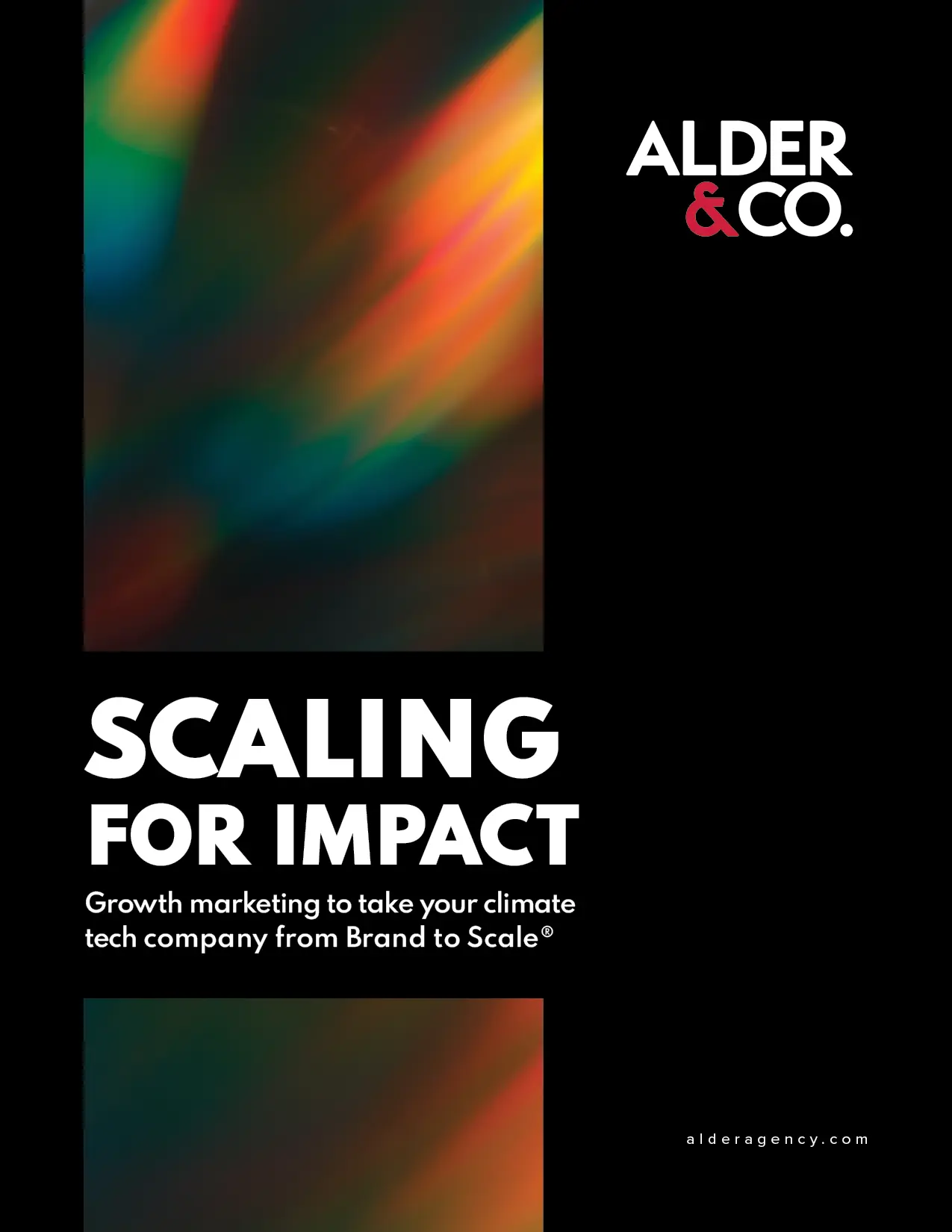Takeaways and lessons learned from Alder’s recent webinar on Partnership Marketing from top climate tech experts
John Lennon and Paul McCartney came together with the Beatles and created pop music. Apple Pay and Mastercard transformed how consumers shop with mobile wallets in the US. EnergyHub partners with manufacturers of thermostats, electric vehicles, EV charging equipment, energy storage systems, solar inverters, and water heaters to enable utilities to manage distributed energy resources (DERs).
What’s common amongst all these transformational partnerships is that two different people or businesses found alignment in what they wanted to see in the world.
A partnership is one of the most potent ways to scale climate technologies because combining expertise and networks across sectors allows you to expand reach, build credibility, open up new markets, and drive sales.
But partnerships can take a lot of work to get right. Depending on your experience and the strength of your relationships, you may struggle to move through the different stages: creating, nurturing, and growing.
To help our network of climate tech founders and marketers better understand partnerships, we recently assembled a team of climate tech marketing experts to share their experience with us, including:
- Elaine Hsieh (CMO, Third Derivative), who is orchestrating companies through the climate ecosystem,
- Keally Dewitt (VP of Marketing, GAF Energy), who is navigating partner marketing under the umbrella of a larger brand, and
- Gilbert Campbell (Founder & CEO, Volt Energy Utility), who is taking the reigns of his organization to greater heights by partnering with behemoth brands.
Here we summarize the key takeaways from the discussion. You can also watch the complete video.
The four essential ingredients for creating and executing a successful partnership marketing strategy
1. Align your mission and intent
Identifying the right partner begins with understanding their mission and values and how they drive them in everyday engagements.
The key questions to ask are,
- What is their mission? What are their values?
- How do they treat their stakeholders?
- How is the value they create perceived in the world?
- Do they have an open mindset around innovation?
- Are they equally committed to creating impact as you?
Gilbert says, “There are a lot of companies out there that have aggressive decarbonization goals. We prioritize those committed to doing things a little bit differently and are focused on climate equity and addressing many problems. And if they’re not, maybe it’s not an ideal partner to work with.”
2. Build trust and nurture relationships
Once your mission and intent are aligned, focus on building trust and nurturing the relationship to allow for a two-way knowledge transfer and value transfer.
For instance, GAF Energy recently launched the world’s first nailable solar shingle in partnership with GAF, North America’s largest roofing manufacturer. The team invested time upfront in understanding how their partners, the roofers, would use and install the product. This earned them the trust of their partners and guidance on how to speak their language when marketing the product.
At the same time, remaining flexible is critical. “It’s important to be transparent and upfront about what we know and remain open to negotiating around those pieces of what we don’t know,” says Keally. “The energy transition is such a big effort. And there’s a lot of ambiguity.”
3. Find a strong business case
A strong business case is the cornerstone of any partnership. Identifying both qualitative and quantitative benefits for both sides is a good starting point.
TS Conductor, one of Third Derivative’s portfolio companies, listened deeply to their partner Berkshire Hathway Energy (BHE) to understand how they could provide value. BHE struggled to upgrade its transmission infrastructure to integrate more renewable energy sources. TS Conductor, a carbon-based, highly efficient transmission conductor, spent six months ironing out pilot details, technological specifications, and budget negotiations. Today, BHE saves $2.5 to $4 Million due to this partnership. At the same time, it created more pathways for TS Conductor to reach additional customers in wind generation.
“Whenever you have a highly technical product, it takes time building the relationship and understanding all the different players within the corporation you’re talking to in terms of their [buying] criteria,” explains Elaine. “And then [startups need to] bridge those gaps and get the data to the right people; that really makes [the partnership process] a lot more efficient.”
4. Build a team that delivers
The final piece of the puzzle is creating the right team. When hiring your partnership (marketing) team, aim for a combination of analytical ability and emotional intelligence to cultivate partnerships.
Empower them with confidence to stay true to your values. Elaine says, “Sometimes the most straightforward thing as a marketer is to say what people want to hear or spin it in a way that will be accommodating. That’s not a formula for success. Find somebody authentic in how they engage with people while holding up the principles of your climate tech company.
A partnership marketing strategy for scaling climate tech
Partnerships can be one way to scale climate technologies quickly. Elaine says, “We’re not going to address climate change at the speed and scale that we need to without partnership, without working together and being authentic and making sure that we’re centered on the right things related to climate impact potential.”
Finally, Keally also reminded us to bring joy, playfulness, and fun to build trust, empathy, and credibility while working toward mutual benefit.
Are you thinking about a partnership marketing strategy for your climate tech business?
Watch the complete webinar to learn more from our panelists, or schedule a call with us to brainstorm a partnership marketing approach for your company.
Missed our previous webinars? Read the recaps here:
- Five Best Practices for Climate Tech Events
- To Build a Winning Climate Tech Marketing Team, Start with the Business Goals Defining Your Marketing Tech Stack
- Behind the Curtain Advice on Marketing to Investors
- Clean Tech Marketing Trends to Watch
About Alder & Co
Alder & Co. is a leading, global strategic brand marketing agency with the mission to drive the adoption of climate technologies until they become universal. Alder partners with forward-facing, innovative climate tech companies who need progressive brand & marketing strategies to drive growth, secure investment and make the impact needed to address our generation’s most urgent crisis – our environment. Find out more: alderagency.com


